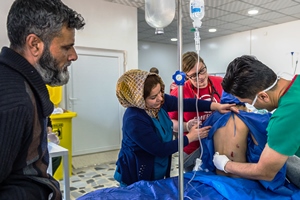News
Region:
Eastern MediterraneanCountry:
IraqNews Topic:
7 May 2017 – Thousands of people have been seriously wounded as a result of the conflict in Mosul, with many patients facing permanent disability as a result of their injuries. To date, more than 8000 people, many of them civilians including women and children, have received treatment in hospitals for trauma injuries since west Mosul operations began. For some, these injuries are life-changing.
The impact of war can include long-term physical and psychological harm to children and adults. Firas Abdullah Musait Shahab, once happily married and a father of 5 children, lost not only his livelihood and home due to the ongoing crisis in Mosul but saw his wife and son die in a bomb blast that left him and 4 of his children scarred and disabled for life.
In January, Firas and his family were caught by an armed group in west Mosul and later used as human shields inside the city. Two months later, they attempted to escape, embarking on a hard journey through streets mined with improvised explosive devices (IEDs). Less than 200 metres into their journey, one of the bombs detonated, and the family was trapped in a blast of fiery smoke.
“When the bomb went off, I collapsed,” said Firas. “When I regained consciousness, I was still holding the hands of 2 of my children. They were both alive but badly injured. In a daze, I could see that one of them had lost an eye, while the other’s back was severely burnt. Next to me, I saw the lifeless body of my third son, whose abdomen had been ripped open, and my wife, also dead. I could not see or hear my 2 other children, and I believed that they had not survived. As the sound of gunfire and more bombs denoting grew, I grabbed my 2 children and ran. Eventually, we arrived to a safe area.”
With the assistance of the Iraqi security forces, Firas and his 2 sons were transferred to a trauma stabilization point established by WHO.
At the trauma stabilization point managed by NYC Medics, WHO’s implementing partner, Firas was treated for superficial wounds on his legs and back. His children’s injuries were more serious, so they were referred to a hospital in Hamam al’ Alil, where his son was diagnosed with a serious eye injury and transferred to an emergency hospital in Erbil. The medical team working round the clock treated the boy and he recovered but his left eye has become permanently blind.
Reunited at the trauma hospital
Two months later, Firas contacted one of his relatives in Mosul to share the news of his wife and son’s demise, only to receive news that his 12-year-old daughter had been found alive soon after the blast. She had been taken to Bartalla Field hospital before being moved to a camp for internally displaced people. “Her right leg had been badly injured in the blast. She was rushed to the operating theatre for major surgery, but doctors say they had no choice but to amputate her leg,” said Firas, still bitter at himself for not saving his daughter.
“Another month passed by and I received more miraculous news: my 4-year-old son had also been found alive at the scene of the bomb. He had been shot in his thigh and abdomen,” said Firas. He was treated in a private clinic in Mosul for 20 days and eventually transferred to Emergency Hospital in Erbil for specialized care.
Firas’s mother and his 3 injured children remain camped at the triage tent in the hospital compound, while his 12-year-old daughter stays in the children’s ward for health care. From time to time, they get to spend some family time together which gives the children some emotional strength.
Firas still feels hopeless for not saving his daughter and younger son at the time of the blast, and for the permanent disabilities, the crisis has caused his children. He also feels extreme pain at losing his wife and son. The mental scars that Firas and his children have sustained will take decades to heal.
“This war has caused me and my children a lot of psychological torment. It is difficult to come to terms with the loss of my wife, my son, and everything we owned. I never want to return to Mosul – there are too many bad memories there, and we have nothing to go back to,” said Firas.
Since the beginning of the crisis, WHO and implementing partners like NYC Medics, Emergency, Aspin, etc. have supported the provision of lifesaving trauma care services by establishing trauma stabilization points and field hospitals like Athba and Hamam Al Alil on the front lines, as well as providing ambulances for transporting increasing numbers of injured patients. WHO and partners are also supporting post-operative and advanced trauma care services in Erbil to allow people like Firas and his children receive the needed life-saving medical care.
Efforts to strengthen trauma care services for Mosul has been possible through support from the UN Central Emergency Relief Fund (CERF), European Commission’s Humanitarian Aid Office (ECHO) and the Office of U.S. Foreign Disaster Assistance (USAID/OFDA).

